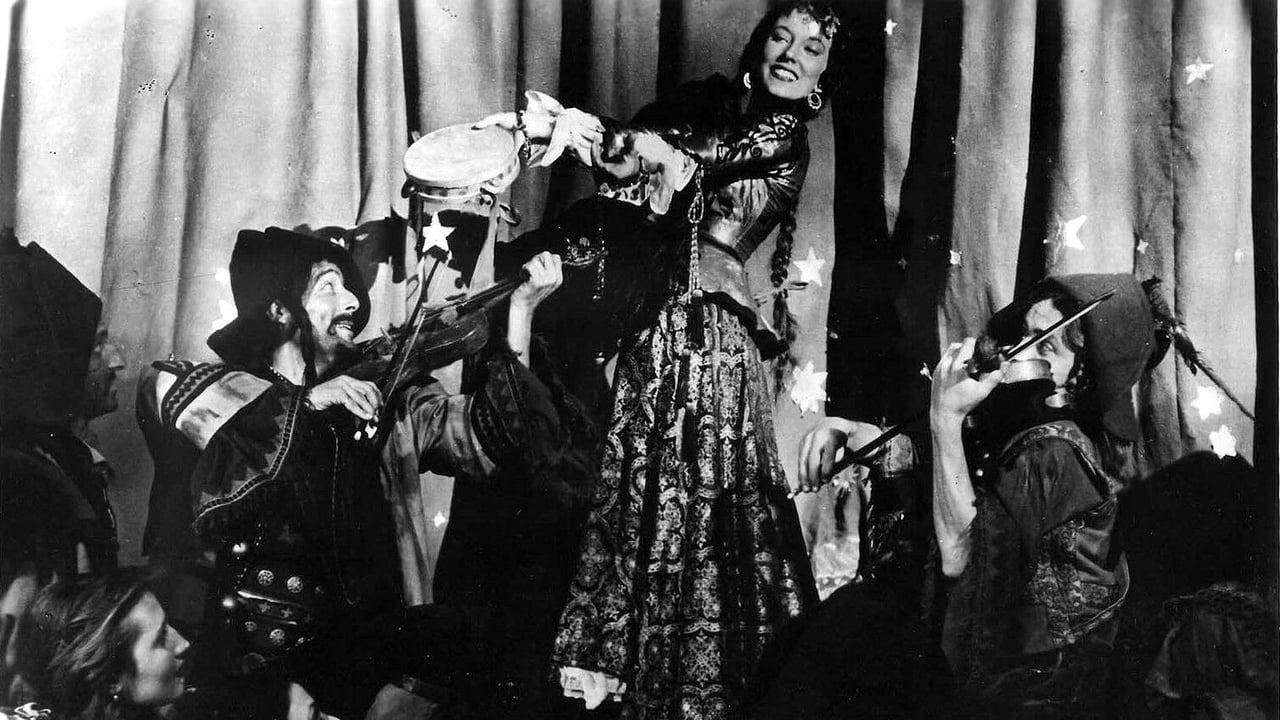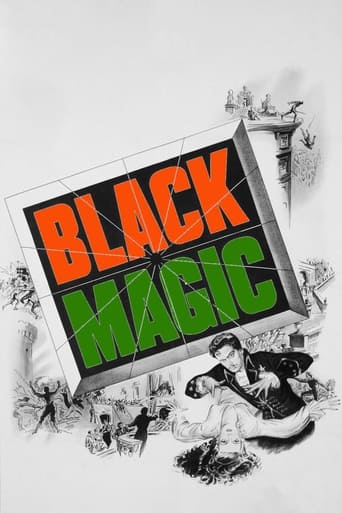



the leading man is my tpye
This is a must-see and one of the best documentaries - and films - of this year.
View MoreOk... Let's be honest. It cannot be the best movie but is quite enjoyable. The movie has the potential to develop a great plot for future movies
View MoreOne of the most extraordinary films you will see this year. Take that as you want.
View MoreYears ago, I had significant training in hypnosis when I was in graduate school. One sad fact I learned is that despite films like "Black Magic" and "The Cabinet of Dr. Caligari", you cannot use hypnotic skills to turn people into slaves to do your evil bidding. I know...I know...a real shame isn't it? So, when I watch movies with plots like these, I just have to turn off my brain and enjoy them without thinking like a psychotherapist.When the film begins in the 18th century, some gypsies are unfairly accused of witchcraft and are executed at the orders of the Viscount de Montagne...and the couple's young son, Joseph Balsamo, is ordered blinded!! The boy is fortunately rescued...but not until after he witnesses his parents' execution. Not surprisingly, this embittered the boy and one day he would return for revenge...but how? One day, the famous hypnotist, Anton Mesmer, recognizes the young man's innate hypnotic skills and trains them. However, Balsamo isn't concerned with using the powers for good and soon disappears...out to make his fortune abusing his gifts. And, soon he's come to once again see the Viscount...and he hatches a plan to destroy him. However, after a while, revenge alone isn't what Balsamo wants...he wants power...and all of France!!The best thing about this film is Orson Welles' magnetic performance. The story is also quite good...and is well worth seeing.By the way, throughout the film folks use the word 'hypnosis'. This term was not coined until the 1820s and the film was set in the 1770s. Not a huge mistake...but it would have been referred to as either magnetism or mesmerism instead.
View MoreRatoff's and Welles' Black Magic (1949) is a great film, in the storytelling tradition of Cinematic Art. It spins what seems like an incredible yarn, but a well thought out screenplay, great acting by Orson Welles in the lead role, and very good direction makes the story believable enough that the film captivated my imagination, and fully engaged me throughout the whole film. By the way, my cynicism about the improbability of this tale was quelled when I read the Wiki article about the real Caglioostro. Although the story in this film deviates significantly from Cagliostro's biography, the real man was even MORE outrageous than the character that Welles portrays in this film.
View MoreSometimes a film is bad enough to exert an almost irresistible fascination, and here's a case in point: an idiotic but colorful melodrama saved in part by Orson Welles' flamboyant performance as Count Alessandro di Cagliostro, a mystic gypsy hypnotist and infamous 18th century charlatan plotting to substitute a somnambulistic imposter to the French throne. Each labored twist of plot falls conveniently into place with an obstinate disregard for logic or coherence (notice how every peripheral character is neatly killed off during the rousing climactic chase), and the period dialogue is, to a word, laughable, in particular during the wacky prologue, where Ramon Burr (as author Victor Hugo) site bedeviled by the character taking shape on the pages before him. Welles' control over the material is obvious: he may have been only an actor for hire, but every baroque and stylish excess bears his unmistakable signature.
View MoreTrivia Question: What role was played (in the movies) by both Orson Welles and Zero Mostel? Answer: Joseph Balsalmo, a.k.a. Cagliostro, the charlatan magician who was a leading social figure in Europe in the 1780s and early 1790s. Mostel, early in his film career, played the imposter in DU BARRY WAS A LADY, opposite Red Skelton and Lucille Ball. Welles played the role in BLACK MAGIC, a more serious film based on one of Alexander Dumas Pere's innumerable historical fables.Basically, the film follows the rise and fall of Cagliostro, building up his tangential involvement in the notorious "Affair of the Diamond Necklace" (1785) which has been the subject of a serious film two years ago. Cagliostro was arrested in that affair's investigation, as the actual culprit was smart enough to lay a path of clues pointing to his involvement.He was released at the conclusion of the investigation (and banished from France). This movie puts him into the center of the plot, his hope being to use it to discredit the Bourbons and take over the country (in reality he would not have gotten anywhere near such a situation - his own aristocratic associates would have prevented it). Welles does nicely as the power-intoxicated anti-hero, but the plot is so ludicrous that it is hard to believe what's going on. But, come to think of it, the affair of the Diamond Necklace itself was pretty ridiculous, so who should complain.There seems to be a cottage industry among film scholars to try to expand the films of Welles that he directed. For the record he directed CITIZEN KANE, THE MAGNIFICENT AMBERSONS, IT'S ALL TRUE, THE STRANGER, THE LADY FROM SHANGHAI, MACBETH, OTHELLO, CONFIDENTIAL REPORT/MR. ARKADIN, TOUCH OF EVIL, THE TRIAL, CHIMES AT MIDNIGHT, F IS FOR FAKE, and two television films: THE FOUNTAIN OF YOUTH and THE IMMORTAL STORY, all of which he completed except for IT'S ALL TRUE (which has since been somewhat preserved and edited, and is on video). He also had a hand in JOURNEY INTO FEAR, MONSIEUR VERDOUX, and THE THIRD MAN. There are some films he directed that (for one reason or another) were never cut or released: DON QUIXOTE, THE OTHER SIDE OF THE WIND, and one other that had to do with people on a sinking yacht. Roughly 21 movies. For a major cinema talent it is a pitiful number (only the French director Jean Vigo is of Welles' stature and did less - but Vigo died prematurely after making three films). So it is understandable that Welles' myriad of fans would want to expand his filmography. But is this actually wise.If one could show Welles' involvement in a film it is a plus to his reputation and that film. Take MONSIEUR VERDOUX. Chaplin had to put down credit that Welles' gave him the idea for VERDOUX - actually Welles suggested doing a film with Chaplin as Henri Landru (the actual wife murderer Verdoux is based on) and Chaplin said no but took the story and turned it into the greatest black comedy film made before DR. STRANGELOVE. People pass ideas back and forth all the time. There is no evidence that Chaplin asked Welles to suggest camera angles or look over the script (Chaplin was brilliant enough to handle that by himself). But it is mentioned in the film credits that Welles suggested the idea for the film. Enough said for that reason.There is no screen credit for Welles assisting Gregory Ratoff in directing BLACK MAGIC. Perhaps there is a reason for this - Welles may have accepted this for tax reasons (he had large tax problems in the U.S. after 1946 when a Broadway production of AROUND THE WORLD IN 80 DAYS with music with Cole Porter flopped). Or perhaps because of industry word that he was an unreliable film director who went over budget (his most successful film was THE STRANGER, which is also one of his least Wellesian in structure or special touches). Or, Welles may have noticed the film was not that particularly interesting or good. It isn't. It is rather padded, and has only one curious element in it: Welles or Ratoff had most of the cast play two roles each. That is a curious innovation, but hardly worth noting. The same year that Welles or Ratoff did that on Black Magic, Alfred Hitchcock did his famous nine minute static scene takes in ROPE. Although not a great idea, it was innovative, and most people recall that film for that particular innovation. Hitchcock also made DIAL "M" FOR MURDER in 3-D, with more success than most directors. But then Hitchcock was a better director than Ratoff.Welles and his friend Akim Tamiroff do well in their juicy parts, but not so the other performers (although the role of Dr. Anton Mesmer is of some interest). As a result the film is fairly forgettable. Which would be a good reason not to include it in a list of Welles' films that he directed. Keep his own work under his own name. Hopefully more of the cut scenes from his own films will eventually get restored. Even to THE STRANGER, but (from our words to God's ear) most hopefully for AMBERSONS.
View More